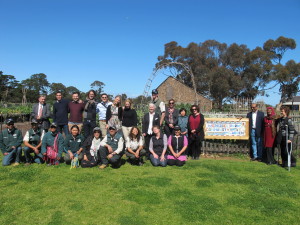Health promotion video features refugee community

Staff members from AMES Australia, NCD Free, Parks Victoria with the Karen community involved in the upkeep and maintenance of the community garden at Werribee Park.
The Karen refugee community at Werribee featured in a new health promotion video that examines the value of food as a tool for enriching health, culture and social contracts.
Produced by not-for-profit health foundation NCD Free and No Frontiers Media, the video titled ‘Sowing Seeds’ depicts the creation and nurturing of a community garden at Werribee Park.
It tells of how the regeneration of the historic kitchen garden at Werribee Park and the volunteering opportunities it offered, provided local refugee communities with the chance to do something useful, learn new skills, meet and share gardening and food.
NCD Free is a new organisation aimed at reducing the harm caused by non-communicable diseases such as diabetes, obesity, heart disease and cancer.
NCD Free spokeswoman Juliette Wittich said, “The video was aimed at showing the overwhelming power of food as a universal enricher of bodies, spirit and culture”.
“Growing and preparing food is an act of community and of belonging – which can have incredibly positive outcomes for health and social interaction,” she said.
Ms Wittich said there was an urgent and growing epidemic of non-communicable diseases in Australia.
“We are seeing an increase in diseases such as obesity and diabetes that are intrinsically lifestyle related,” she said.
“In Australia we need to change the conversation about these diseases and promote the idea that there are choices people can make that will prevent these diseases.
“And there is so much we can learn from communities like the Karen who have a deep connection with food,” Ms Wittich said.
Werribee Park Chief Ranger, James Brincat, said the community garden provided an obvious health benefit.
“But there is also a social benefit and a feel-good benefit – this is an example for other communities to follow,” Mr Brincat said.
“It has been amazing to watch what has happened here,” he said.
“What started out as community project to rebuild the old kitchen garden here at Werribee Mansion has turned out to be an incredibly successful social experiment and a model for other community engagement projects.
“Everyone involved in this is blown away by what we’ve achieved and the inspirational outcomes that have come from putting some seeds in the ground and seeing what happens – both literally and figuratively,” Mr Brincat said.
AMES Australia Manager of International and Community Development, Dr Melika Yassin Sheikh-Eldin, says that people from several emerging communities have been attracted to the park’s volunteer program.
“Many of them have come from difficult circumstances or have spent years in refugee camps,” she said.
“Members of these communities, who are striving to adjust to a new country, are encouraged to join the program so that as well as gardening, they can learn new skills, develop social networks and gain an understanding of a new culture.
“The program has helped many people overcome health or social issues and it can offer a pathway to meaningful employment.” Dr Sheikh-Eldin said.
The Karen people gravitated to the Werribee area after the first of them who arrived in Victoria as refugees were settled there.
The Karen are an ethnic minority and have been persecuted by the Burmese government for 30 years. There are estimated 150,000 Karen living in refugee camps in or on the Thai border.
The Burmese army have systematically destroyed Karen villages and in operations described by human rights groups as ethnic cleansing.
A largely agrarian and village-based people, Karen refugees have often encountered difficulties when settled in urban locations around the world.
Traditionally, they are gardeners and cultivators and living in an urban environment has left many of them dislocated and suffering depression. But being able to volunteer in the gardens of Werribee Park has had a remarkable effect on them.
Mr Brincat says that many of the local refugee communities have suffered clinical depression and that their health has improved because of the program.
“What we’ve seen is that people find a sense of self-worth being able to come here and do something constructive,” he said.
To view the video click here.
Jess Phillips
AMES Australia Staff Writer












